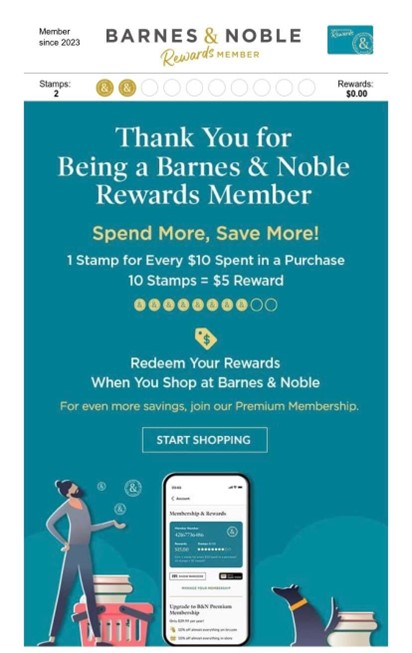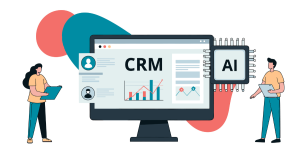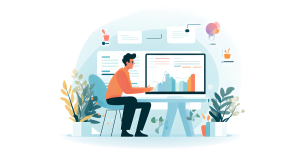Those in the marketing world are used to looking forward to the next campaign, the next sale, the next customer. We’re here to remind everyone of the importance of taking a step back and focusing on the success you’ve already managed to achieve. Your current customers are an attestation to how much you’ve grown but they’re also evidence of the potential you have to continue growing. Improving customer loyalty and building strategies for retention is a key factor in boosting sales and growing —learn how your CRM can help you do it.
What is a CRM System?
CRM stands for Customer Relationship Management, and having a strategy and system in place helps marketers stay on top of customer data. A CRM stores everything from basic contact information to engagement history to past purchases. Not only is it a great way to keep a lot of information well-organized and easy to reference, but it can also help teams be more productive, boost sales, and the topic of this blog — improve customer loyalty.
Customer Retention and Loyalty
Now to really dive in. How does CRM actually relate to customer retention and loyalty?
Customer retention can be a significant source of revenue for any business. Repeat business is business that has already made it through the customer journey. We’ve spent marketing dollars to get on their radar and nurture them to their first purchase. In many cases, it is a much smaller lift to take care of these relationships than it is to go out and find new ones.
You’ll find one of the major benefits of customer retention is cost-effectiveness and that’s because you’re able to see an impact on the overall lifetime value of a customer. Someone that trusts your business is going to come back and likely make larger purchases with time. Think about a product that you’ve come to love. This is something that you are repurchasing when you run out, stocking up on during sales, and eyeing whenever you see it pop up in your inbox or on your social. It’s also likely if you love this product, you’re open to giving other products by the same company a try.
CRM can aid in all this by helping to manage those hard-earned relationships and giving you the tools you need to personalize your customer’s experience. Here are some of the ways CRM plays a role in customer retention and loyalty:
- Organized Data: There’s a lot to know about your customers and their experiences with your company, especially if they’ve been around for a while. CRM keeps it all organized so you’re not missing pieces or digging for information.
- Content Personalization: Once customer data is easily being recorded and tracked, personalization is the next obvious (and easy) step. Reach audiences with personalized content based on past purchases like asking for reviews, sharing tips related to specific products, or more deals on related items.
- Customer Service: When the conversations get rolling, it can be difficult to stay on top of every interaction. CRM ensures you have all the details and the history so that you’re not going into conversations blind and causing frustration on both ends.
- Collaboration: Teams communicate much more easily when everyone is on the same page. Working out of the same platform is one solution and it’s a smart way to coordinate efforts across the company.
Retention Marketing Strategies & CRM
There are lots of ways people leverage CRM in their retention strategies. Here are a few examples we love:
Rewards Programs
People like being rewarded for what they do. That’s just a fact of life and companies have caught on. Creating a loyalty program is a great way to get customers to keep coming back. It can be as simple as offering a discount after a customer spends a certain dollar amount or creating exclusive sales. Your CRM can help structure this and track everything that comes in so you know where your loyal customers are and can reward them accordingly.
Barnes & Noble, for example, has done a great job with this. They revamped their old program and created a free membership and a premium membership so that everyone can take part. Purchases go towards earning stamps and once ten stamps are accumulated, they can be redeemed for a discount or saved up for bigger purchases.

Personalized Marketing Experiences
We’ve covered personalization a lot, but we can’t emphasize it enough. A successful marketing strategy centers the customer and there is no better way to do that than to make their experience as unique as possible. No one wants to feel like a number. Instead, they want to be wined, dined, and shown how valuable they are. Something as simple as addressing someone by name can go a long way.
Continuing with the previous example, Barnes & Noble sends a “Hey ____, have you started shopping with your rewards yet?” email soon after someone signs up for a membership. Even as a marketer who knows this gets sent out to everyone, it still feels personalized. Why? Because they call you out and ask you about your experiences. It gets customers thinking about purchases they have already made or the next one. This deepens the experience and solidifies you in the customer’s mind.
Consistent Communication
There are some people who enjoy scrolling through their feeds or inboxes and seeing marketing content. It’s that internal urge to know what deals are happening and what products are being released. A way to have more control over this is to utilize your CRM to maintain consistent communication with your customers.
This could be emails detailing weekly specials, reminders, or even updates on issues or orders. Pair your CRM with a smart and intuitive marketing automation platform like the emfluence Marketing Platform and you’ll have a lot of versatility to work with in your templates and campaigns. You can also automate as you go so once something is set up, it’s ready to get to work.
Consistent communication keeps you in the forefront of your customers’ thoughts. I’m excited about a new book by my favorite author and plan to pre-order? Hey, I remember that email last week about earning rewards. Maybe I should take that into consideration when deciding who to buy from.
And for those that hate all the content? Give them the option to adjust communications to their liking whether that’s just the essentials or only a monthly recap.
Data Utilization
Data is valuable — that’s why everyone is so motivated to earn it and keen to protect it. Having the right insights to guide your thinking can transform your strategies. This can help you discover your customers’ needs and improve how you move forward with your relationships.
Use your CRM to keep track of customer purchasing habits, interactions through web, social, or email, the types of products they’re interested in, and even feedback. You can learn what aspects of your company boost satisfaction and what aspects are a pain point. With this data in hand, you can create unique and targeted strategies that improve the overall customer experience.
The Takeaway
Focusing on loyalty and retention strategies is the key to profitability. Relying solely on new customers is a hard road to growth. Instead, be sure to spread the word and also focus your attention on building powerful relationships with the customers you already have. A CRM system is a great solution for managing it all. You find clear insights for navigating and planning out strategies that enhance the experience for your customers.


